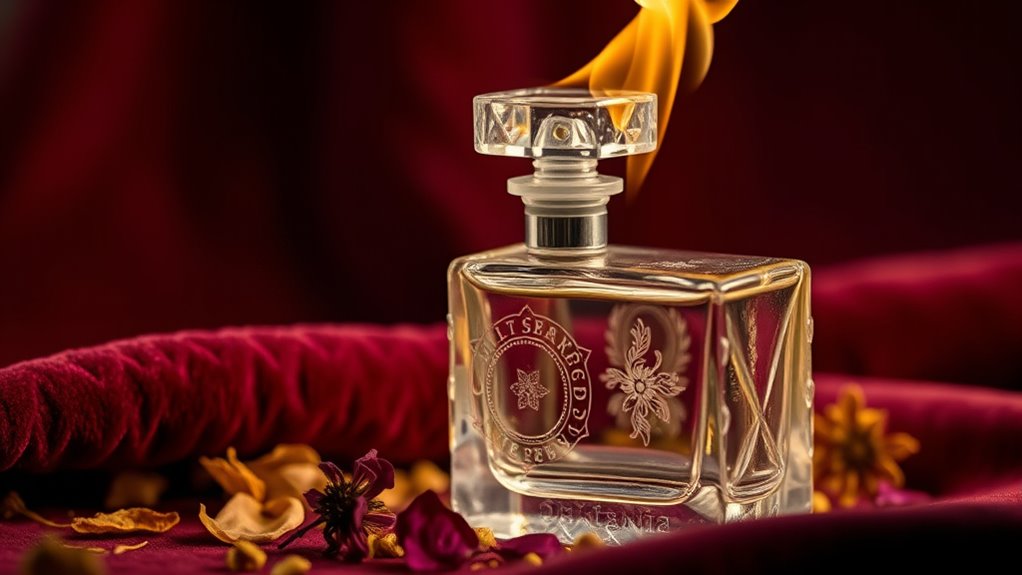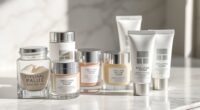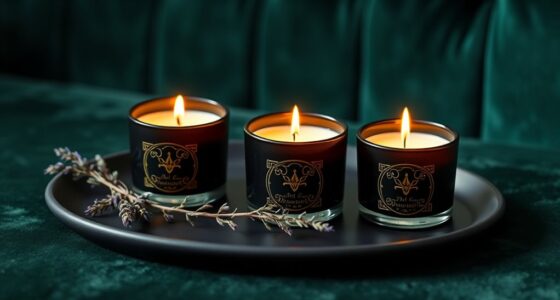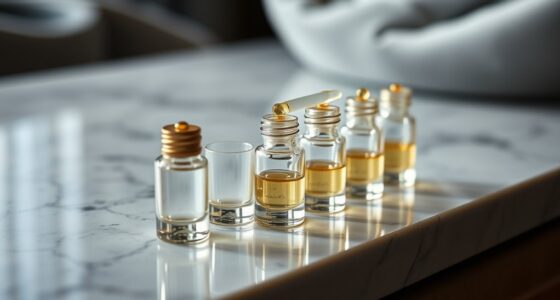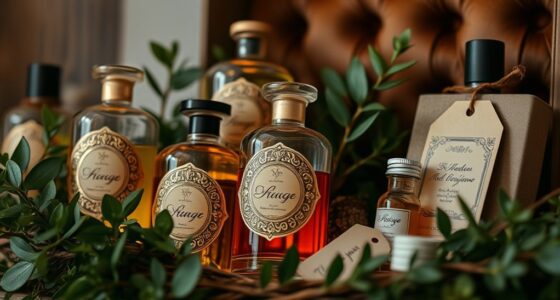Niche fragrances cost more because they offer rare, high-quality ingredients and are crafted in small batches with artisanal techniques. These scents are unique, reflecting artistic vision and authenticity that mass-market perfumes can’t match. Their exclusivity and limited availability boost personal expression and status. Plus, many brands prioritize sustainability and ethical sourcing, which adds to their value. If you want to understand how these factors create truly one-of-a-kind scents, there’s more to uncover.
Key Takeaways
- Limited availability and rare ingredients increase exclusivity, making niche fragrances a statement of individuality and prestige.
- Handcrafted artisanal techniques ensure authenticity, artistic storytelling, and a unique olfactory experience.
- Use of high-quality, labor-intensive ingredients like Oud, Bulgarian Rose, and Ambergris justifies premium pricing.
- Fragrances are crafted as art, emphasizing natural botanicals, craftsmanship, and emotional storytelling.
- Ethical sourcing, sustainability, and eco-conscious practices add value, appealing to discerning, conscious consumers.
The Appeal of Exclusivity and Rarity
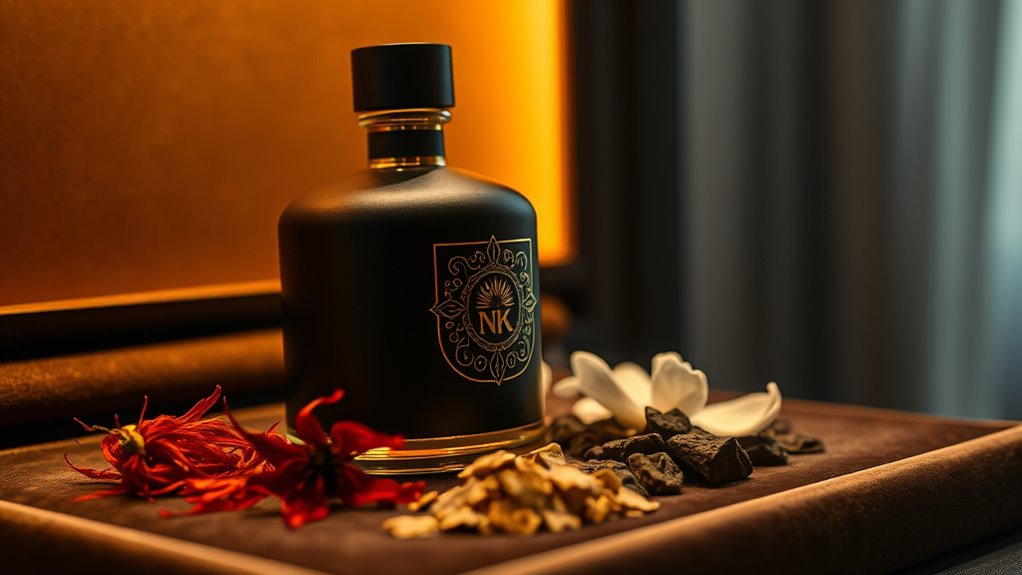
The appeal of exclusivity and rarity in niche fragrances lies in their limited availability, which makes them highly desirable. When you choose a niche scent, you’re embracing a sense of uniqueness that few others can claim. These fragrances often feature rare ingredients like Iris Pallida, Oud, and Ambergris, adding significant value and scarcity. Limited production runs and small-batch craftsmanship mean each bottle is a rare find—crafted with care and attention to detail. Because of their exclusivity, these scents often carry a sense of status and personal distinction. You’re not just wearing a fragrance; you’re investing in a one-of-a-kind olfactory experience. This rarity heightens their appeal, making them more than just perfume—they’re a statement of personal identity and individuality. Additionally, the process of creating these scents often involves attention in creative practice, ensuring that each fragrance is a meticulously crafted work of art. The meticulous selection of rare ingredients further underscores their uniqueness and artistic value. Moreover, the limited availability of these fragrances fuels their desirability among connoisseurs and collectors alike.
Artistry and Craftsmanship Behind Niche Fragrances
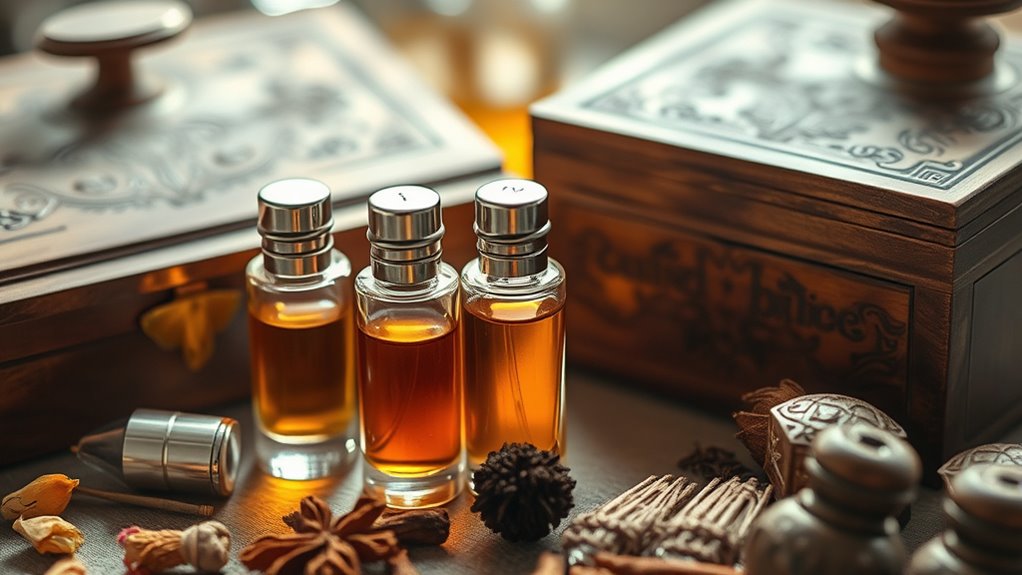
You can see the artistry in niche fragrances through their handcrafted techniques and traditional methods, which emphasize attention to detail. Master perfumers often source rare, high-quality ingredients from around the world to craft distinctive scents. Every bottle and composition tells a story, showcasing the creative vision and craftsmanship that set these fragrances apart. This meticulous approach reflects a human-centered methodology, ensuring that each fragrance resonates uniquely with its wearer.
Handcrafted Techniques and Traditions
Handcrafted techniques form the heart of niche fragrances, where artisans meticulously apply methods like cold-pressing, enfleurage, and artisanal distillation to preserve the essence of rare ingredients. These traditional processes guarantee each scent retains its authenticity and depth. You’ll notice that many niche perfumers still rely on age-old techniques such as maceration and layer blending, which demand skill and patience, resulting in complex, layered scents. The creation of these perfumes involves manual steps like hand-assembling and custom formulation, emphasizing craftsmanship over mass production. Artisans source raw materials through time-honored methods, like hand-picking and natural extraction, to guarantee purity. This dedication to handcrafted techniques and artisanal distillation truly sets niche fragrances apart, giving them a character that’s rich, authentic, and deeply rooted in tradition. Attention to detail in the crafting process ensures each fragrance is unique and meticulously developed, often incorporating traditional methods that have been passed down through generations. Moreover, the emphasis on artisanal craftsmanship underscores the commitment to quality and heritage in every bottle.
Rare and Premium Ingredients
Ever wonder what makes niche fragrances truly exceptional? It’s the rare ingredients and the artistry behind natural perfumery. Many of these ingredients, like Iris Pallida and Bulgarian Rose, demand labor-intensive cultivation and extraction processes that can take years, driving up costs. Oud, one of the most coveted ingredients, is derived from infected heartwood that takes years to produce resin; high-quality oud can cost over £1 million per 127kg. Ambergris, a marine-derived substance, develops over years in the ocean and can reach $5,000 per pound. Sourcing jasmine requires immense effort—around 7.6 million flowers for just 1 kg of absolute. These rare ingredients showcase the craftsmanship and meticulous techniques perfumers use to craft distinctive, luxurious scents.
Artistic Vision and Storytelling
The artistry behind niche fragrances transforms rare ingredients into storytelling masterpieces that evoke emotion and imagination. Each scent is a carefully crafted work of art, reflecting a unique artistic expression and conceptual depth. You’ll notice how perfumers select ingredients meticulously, blending slowly to guarantee harmony and detail. These fragrances often tell a story, capturing a mood or idea that resonates personally. The use of self watering plant pots as a metaphor highlights how both art forms require patience and precision to achieve their full expressive potential. Traditional techniques elevate craftsmanship to an art form. Fragrances become olfactory narratives, inviting you to experience a personal journey that mirrors the artistic process involved in creating exceptional works. Achieving this level of craftsmanship often involves meticulous attention to detail, underscoring the dedication necessary for both art and fine perfumery. Recognizing the artistic vision behind each fragrance deepens appreciation for what makes niche scents truly unique. Moreover, the intricate process of selecting and combining ingredients demonstrates a dedication similar to grocery savings strategies, where careful planning and precision lead to superior results.
High-Quality Ingredients and Natural Botanicals
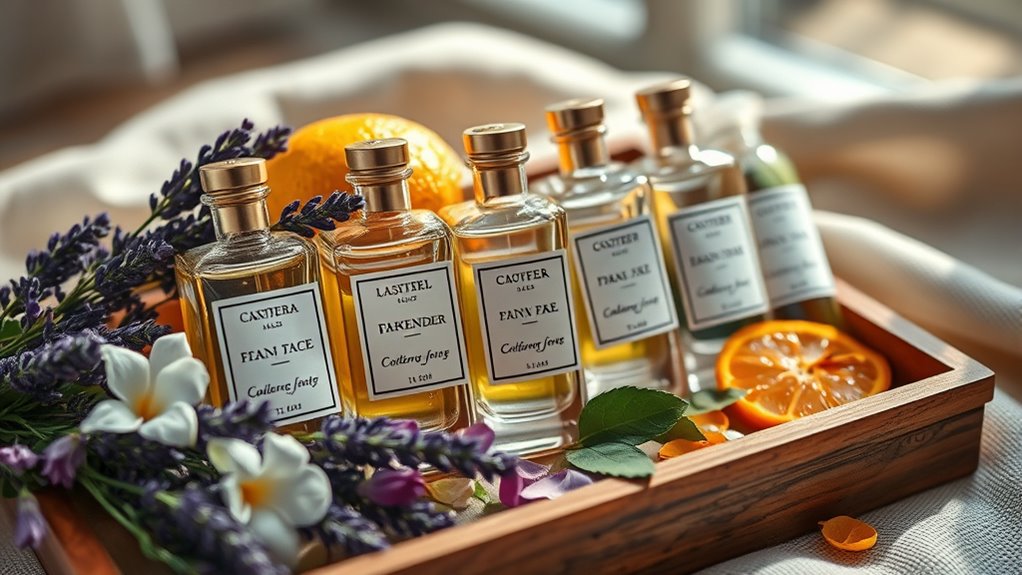
When you choose a niche fragrance, you’re selecting products made from rare, carefully sourced botanicals like oud, jasmine, and Bulgarian roses. These ingredients are often cultivated through artisanal practices, ensuring purity and sustainability. By prioritizing transparency and quality, niche brands deliver authentic scents that stand apart from synthetic alternatives. Additionally, some niche fragrance producers incorporate organic farming practices, emphasizing environmentally friendly cultivation methods that align with consumer demand for sustainable products. This focus on ethical sourcing not only preserves the environment but also ensures the highest quality ingredients for a truly unique scent experience. Furthermore, the use of rare botanicals contributes to the exclusivity and depth of these fragrances, making them highly sought after by connoisseurs.
Artisanal Sourcing Practices
Artisanal niche perfumes stand out because they prioritize sourcing high-quality ingredients from specialized growers who focus on sustainability. This artisanal sourcing guarantees that each natural ingredient, like rare absolutes and essential oils, meets strict standards of purity and craftsmanship. These ingredients often require labor-intensive harvesting and traditional extraction methods, which take years to cultivate, such as Iris Pallida or Bulgarian Rose. By choosing these practices, you benefit from fragrances crafted with authentic, naturally sourced components. Additionally, many artisans incorporate traditional extraction techniques to ensure the integrity and potency of each ingredient. The dedication to sustainable cultivation further ensures that these ingredients are produced with minimal environmental impact, supporting both the ecosystem and local communities. Implementing artisanal sourcing practices also helps preserve age-old traditions and promotes biodiversity within the cultivation process. As a result, these practices contribute to a more resilient supply chain, reducing reliance on mass-produced components and enhancing the uniqueness of each fragrance.
Rare Botanical Extracts
Have you ever wondered how rare botanical extracts like Iris Pallida and Bulgarian Rose achieve their exceptional quality and depth? It’s because they come from meticulous, labor-intensive harvesting processes that can take years of cultivation before extraction. These high-quality natural ingredients are often sourced from specific regions—jasmine from Grasse and oud from Southeast Asia—ensuring purity and exclusivity. Extracting botanicals like jasmine absolute involves over 7.6 million flowers for just one kilogram of oil, highlighting their rarity and cost. Traditional methods such as cold-pressing or solvent extraction preserve their complex aromas. Sustainable farming practices promote the conservation of rare plant species and help maintain ecological balance. Additionally, cultivating these botanicals with ethical sourcing ensures that their extraction does not harm local ecosystems or communities. Using these authentic botanicals supports sustainable farming and biodiversity, offering a natural alternative to synthetic ingredients while enriching your fragrance with unmatched depth and character.
Authentic Ingredient Transparency
Authentic niche fragrances stand out because they prioritize transparency about their ingredient sources, allowing you to trace each ingredient back to its origin. This ingredient transparency ensures you’re getting genuine, high-quality natural ingredients rather than synthetic substitutes. You’ll notice that these perfumes often feature botanicals like Bulgarian roses or Egyptian jasmine, carefully sourced from specific regions. The extraction methods—such as cold-pressing or solvent distillation—preserve the true aromatic profile of each ingredient. Brands committed to transparency often provide detailed information about farm origins and harvesting techniques, emphasizing their dedication to authenticity.
- Sourced from specific regions for purity
- Emphasis on natural essential oils and absolutes
- Rarity reflects effort and quality
- Clear disclosure of ingredient origins
Small-Batch Production and Limited Releases
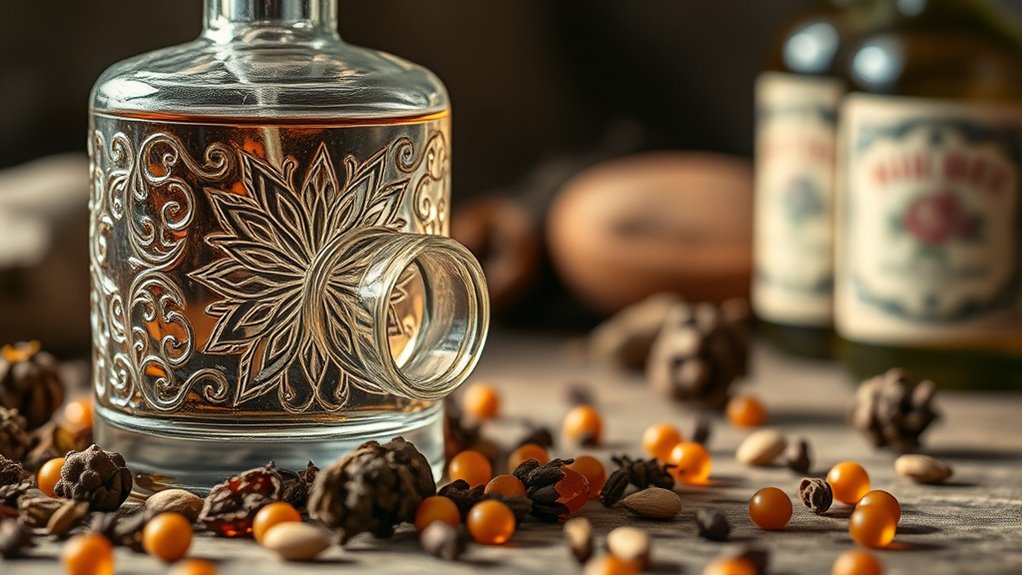
Small-batch fragrance production offers a level of exclusivity that mass-market scents can’t match. With small-batch, limited releases, you get a rare scent crafted in small quantities—often fewer than 1,000 bottles. These fragrances are made in specialized ateliers or by independent perfumers who oversee every step, from hand-pouring to hand-labeling. This limited approach guarantees each bottle maintains high quality and uniqueness, avoiding overproduction that can dilute a brand’s prestige. Because of their scarcity, these scents are more desirable and command a premium price. When you choose small-batch or limited-release fragrances, you’re investing in a more artisanal, carefully crafted experience that stands out from mass-produced options, offering you a truly distinctive and personal scent.
The Role of Independent Perfumers and Authentic Control
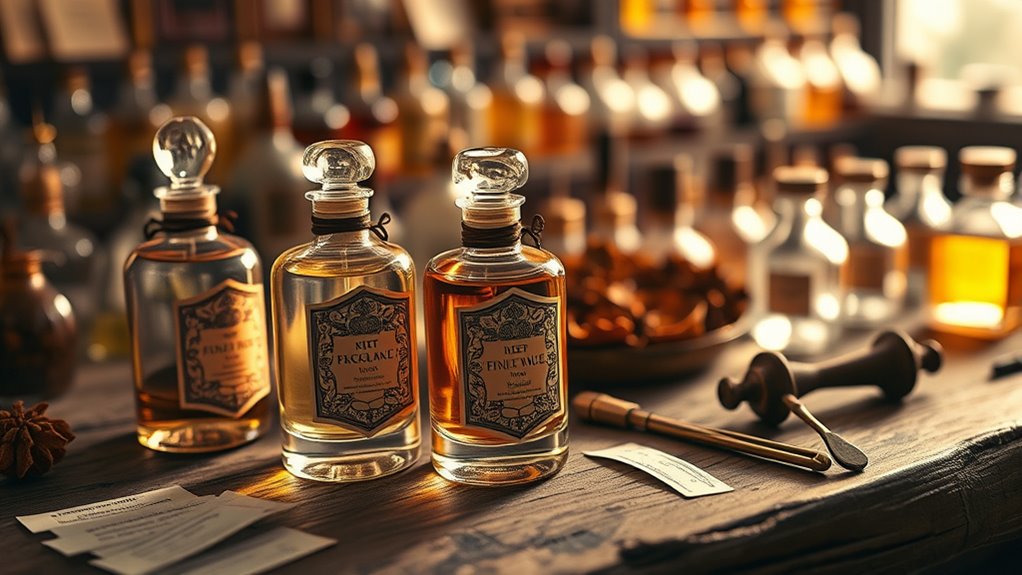
Independent perfumers play a pivotal role in guaranteeing the authenticity and quality of their fragrances by controlling every aspect of the creation process. With authentic control, you get transparency in ingredient sourcing, often emphasizing natural, ethically sourced, or rare materials. Unlike mass-market brands that rely on large fragrance houses like Givaudan or Firmenich, true indie perfumers oversee every step, from sourcing to packaging. This direct oversight guarantees unique scents that reflect their personal artistic vision.
- They develop fragrances in small batches for limited editions.
- They maintain full creative control, avoiding commercial trends.
- They select high-quality, often rare ingredients.
- They ensure authenticity in every bottle.
This approach creates distinct, memorable scents you’re unlikely to find elsewhere, justifying the premium price for a truly unique fragrance.
Differentiating True Artisanal Perfumery From Mass Manufacturing
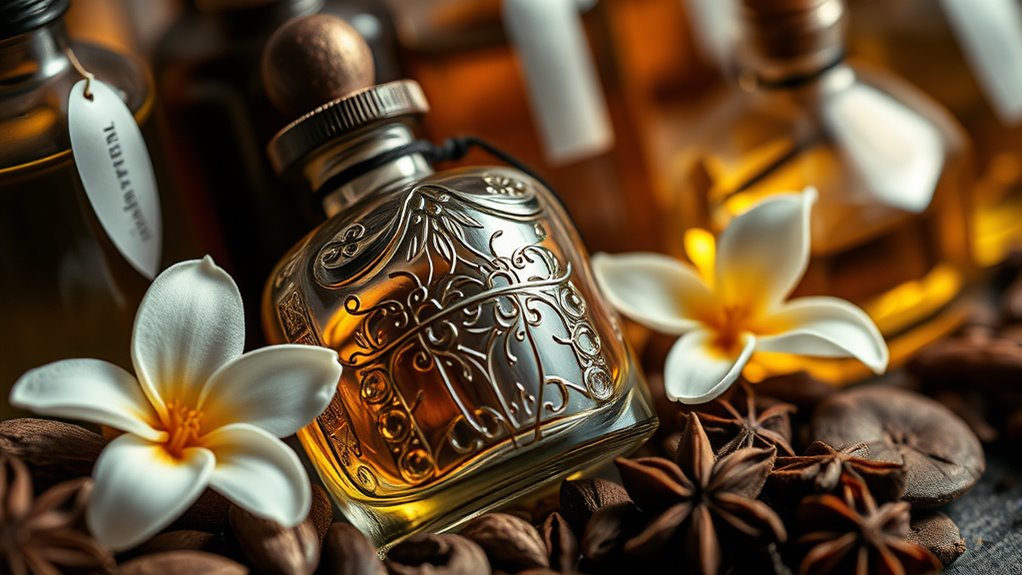
While many brands market themselves as artisanal or niche, discerning whether a perfume is genuinely handcrafted requires careful scrutiny. Authentic artisan perfumeries control every stage of creation, sourcing, and production, often making small batches with handcrafted techniques. Unfortunately, many so-called artisanal brands rely on large fragrance houses like Givaudan or Firmenich for formulation, turning their products into mass-produced items. True independent perfumers, such as Tauer Perfumes and Hiram Green, oversee every step personally, ensuring authentic craftsmanship. To identify genuine artisanal perfumes, look for brands with in-house perfumers, transparent ingredient sourcing, and a clear distinction from major fragrance conglomerates. This level of control and transparency is what truly sets authentic artisan perfumeries apart from mass manufacturing.
The Impact of Unique Scents on Personal Expression
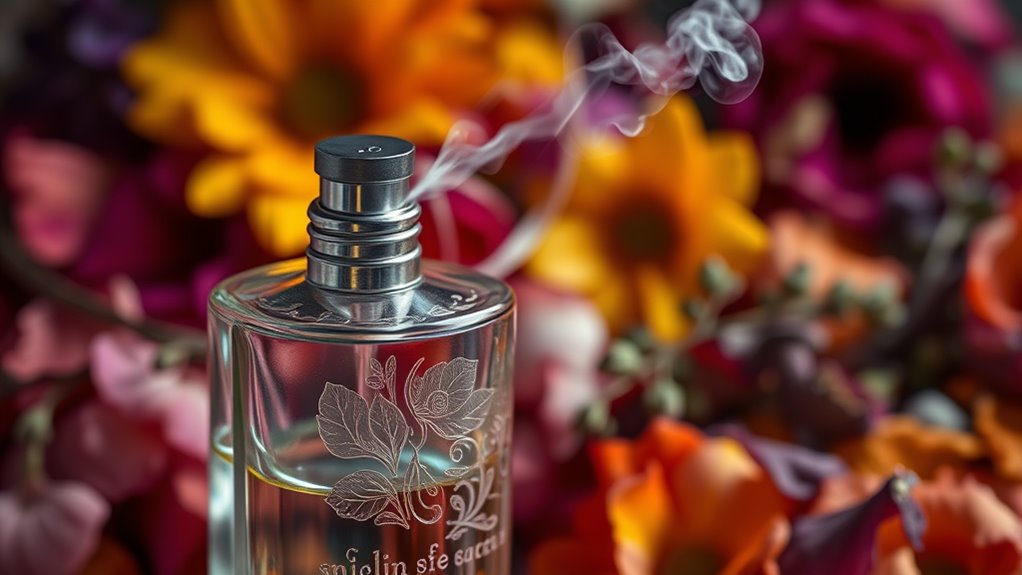
Unique scents serve as a powerful tool for personal expression, allowing you to craft an olfactory identity that’s distinctly yours. When you choose fragrances with rare ingredients or unconventional compositions, you communicate your personality without saying a word. These unique scents make your personal expression more memorable and authentic. They also help reinforce your personal brand and boost confidence. Limited-edition or artisanal perfumes create exclusivity, helping you stand out in social or professional settings. Custom-layered or evolving niche fragrances reflect your creativity and depth, showcasing a truly unique sensory signature over time.
- Stand out with rare ingredients.
- Communicate personality silently.
- Reinforce confidence and branding.
- Showcase creativity through evolving scents.
Debunking Myths: Are Niche Perfumes Really More Expensive?
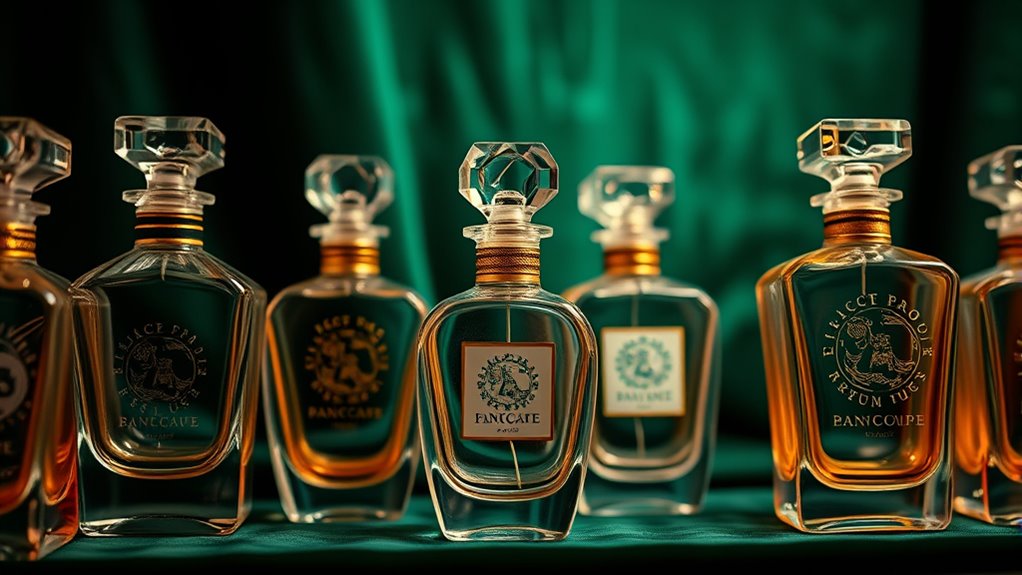
Many assume that niche perfumes are always more expensive, but the truth is more nuanced. While they often cost more, it’s mainly due to their use of rare, high-quality natural ingredients like oud, iris, and ambergris, which markedly increase production costs. Niche fragrances also emphasize exclusivity and artisanal craftsmanship, justifying higher prices—though many are made in large-scale manufacturing facilities, making the price more a marketing strategy than an indicator of true craftsmanship. Sometimes, their production costs are similar to premium designer fragrances. The real difference lies in ingredient choice and branding, which elevate the perceived value. So, while niche perfumes can be pricier, it’s not solely because they’re niche brands—they often reflect the premium quality of natural ingredients and the allure of exclusivity.
How Niche Fragrances Support Sustainable and Ethical Practices

Niche fragrances often lead the way in sustainable and ethical practices by prioritizing responsible sourcing and transparent supply chains. They focus on sustainable sourcing, using organic ingredients and supporting local farmers to lessen environmental impact. Authentic niche perfumes employ ethically harvested rare ingredients like oud, Bulgarian rose, and ambergris, promoting fair trade practices. Smaller batch production minimizes waste and reduces the carbon footprint compared to mass-market methods. Natural and artisanal ingredients are sourced through transparent supply chains, encouraging ethical labor and biodiversity preservation. By aligning with eco-conscious values, niche brands support responsible farming, sustainable harvesting, and cruelty-free testing.
- Prioritize organic ingredients and local sourcing
- Support fair trade and ethical labor practices
- Use small batch production to reduce waste
- Promote biodiversity and eco-conscious farming
Frequently Asked Questions
Why Are Niche Fragrances More Expensive?
You might wonder why niche fragrances cost more. Well, they use rare, high-quality ingredients like oud or jasmine, which are expensive to source and extract. Their limited production runs and small batches make them exclusive, increasing their value. Plus, craftsmanship and sustainable sourcing add to costs. When you buy a niche scent, you’re paying for artistry, uniqueness, and luxury, making it worth the investment.
Are Niche Fragrances Better Than Designer?
You might think niche fragrances are better than designer ones, but it’s not always the case. They often offer more complex, unique scents thanks to rare ingredients and craftsmanship, appealing to your desire for individuality. However, whether they’re truly better depends on your preferences. If you value exclusivity and artistry, niche scents deliver that experience. But if you prefer familiarity and brand recognition, designer perfumes might suit you just as well.
What Makes a Fragrance More Expensive?
You might wonder what makes a fragrance more expensive. It’s often the rare, high-quality ingredients like oud or Bulgarian rose that cost a lot to harvest and process. Limited production, small batches, and the involvement of renowned perfumers also boost prices. Plus, luxurious packaging and storytelling add to the value. When you pay more, you’re investing in exclusivity, craftsmanship, and a unique scent experience that mass-market perfumes can’t offer.
What Is the Best Niche Fragrance Ever?
The best niche fragrance is often a matter of personal taste, but some standouts like Amouage Interlude Man, Creed Aventus, Kilian Black Phantom, and Maison Francis Kurkdjian Baccarat Rouge 540 consistently top the charts. You might say they set the bar high, thanks to their artistry and originality. If you’re after a scent that leaves a lasting impression, investing in a top-tier niche fragrance is worth every penny.
Conclusion
When you choose a niche fragrance, you’re embracing a world of artistry and rare ingredients that dance on your skin like a secret whispered in the breeze. It’s about more than just scent—it’s a story, a craft, a statement of individuality. With each spray, you carry a piece of craftsmanship, a splash of authenticity, and a commitment to sustainability. Truly, paying more brings you closer to a scent as unique as your own signature.
